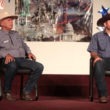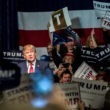Listening to President Bush delivering his State of the Union address—a poorly camouflaged 2004 campaign speech—made us think more sharply about the months to come before Election Day and the fate of the union if he wins a second term.
Opinion polls and pundits agreed. So did voters in the February 3 primaries and caucuses. By giving Senator John Kerry the lead in five of those seven contests, a big turnout of rank and file Democrats endowed the Massachusetts senator with a stronger grip on his party’s presidential nomination, not to be formally determined until late July at the Democratic convention in Boston, Kerry’s hometown.
The AFL-CIO and many of its member unions appear to be waiting for the Democratic convention to install a presidential nominee before giving its expected endorsement, but some unions won’t wait. The million-plus-member American Federation of Teachers has endorsed Kerry.
Astrologers plugged Kerry, too. In a February 3 New York Times op-ed piece one reader of the stars concluded that the senator’s Sagittarius chart gives him “little tolerance for fools” and that “the long-term picture depicts him achieving his highest goals.”
Kerry won the primaries or caucuses in Missouri, Arizona, New Mexico, Delaware and North Dakota. While Senator John Edwards won handily in South Carolina, next to his North Carolina jurisdiction, and retired Gen. Wesley Clark won narrowly in Oklahoma, they were unlikely to win decisively in most of the remaining primary races. Clark came in fourth in South Carolina, behind Kerry and the Rev. Al Sharpton, and second in three other states. Former Gov. Howard Dean of Vermont was mostly out of action in these races. Representative Dennis Kucinich of Ohio hasn’t found a constituency anywhere.
Senator Joe Lieberman of Connecticut, who had counted on winning the Delaware primary, won only 11 percent of the vote there and became the second contender to quit the race since the primary season began, joining Missouri’s Representative Dick Gephardt in bowing out. Missouri was the biggest prize among the seven February 3 races, with the possibility of providing Kerry with up to 74 delegates.
In polling place interviews a big majority of voters said that “electability”—the chance of defeating Bush in November—was their determining factor in picking Kerry. Even the militantly right-wing, pro-Bush magazine the Weekly Standard concedes that the decline of Dean and the rise of Kerry and Edwards in Iowa was “bad news” for Bush. The Bush White House “would have preferred Dean,” it says, because Dean would have been “the easiest Democrat for Bush to beat” and because “Kerry and Edwards are far more electable.”
Exit polls at voting places have shown that the Democratic contenders’ beat-Bush campaigns are gaining them wide support. The Washington Post columnist E.J. Dionne has said that since the 9/11 attacks, “it is hard to think of any other president who has gone so quickly from being unifying to divisive.”
In a parody of the Rev. Martin Luther King’s famous line, “I have a dream,” Howard Dean has been repeatedly characterized as the candidate who says: “I have a scream.” As Stuart Rothenberg, a columnist in the Capitol Hill newspaper Roll Call, put it, Dean’s most pressing task is “to prove that he isn’t certifiably crazy.”
THE OTHER CAMPAIGN—This year’s SOTU—that’s Washington gobbledegook for the State of the Union address by the POTUS, the president of the United States—was one of Bush’s important election-related activities.
“Related activities,” indeed. Nearly all commentators took jabs at Bush’s mealy-mouthed retreat from his accusation in last year’s address to Congress that Saddam Hussein had “weapons of mass destruction.” He is now making the subsumed judgment that Hussein had “weapons of mass destruction-related program activities.”
It is no joking matter, but sometimes laughter lightens the feeling of being furious. In theAtlanta Journal-Constitution the editorial cartoonist Mike Lukovich pictured Bush at the SOTU podium saying, “We know the Martians have tried to buy uranium from Neptune.” We keep seeing editorial-page cartoons showing space-suited, but-still-cigar-smoking, figures labeled “Halliburton” on Mars, sent there to capitalize on the president’s manned mission to outer space. In one, labeled “George W. Bush’s dream,” by Bob Rogers in the Pittsburgh Post Gazette, a suited-up explorer on Mars says: “One small step for man, one giant step for Halliburton.” He is standing beside an oil well tower.
And belatedly, having been confronted by the informed view of David Kay, the veteran weapons searcher who headed the Iraqi Survey Group, that there were no WMDs in Iraq when the U.S. went to war there last March, Bush says he will appoint a non-partisan investigative panel to see what went wrong with our intelligence. But it will be told not to report until after Election Day.
Under mounting criticism for balking the separate, and ongoing, investigation of the intelligence agencies’ failure to detect the 9/11 terrorist attacks, the president reversed himself and agreed to stretch the May deadline he had imposed for its final report to July 26; that’s a month before the Republicans gather near Ground Zero in New York for their nominating convention. The bipartisan, 10-member 9/11 investigative commission may try to bring the president and vice president before it for closed-door questioning.
Bush may have been encouraged to relent on stretching the 9/11 deadline by the investigation in London that had just given Prime Minister Tony Blair a clean bill of health on his prewar insistence that Saddam had WMDs ready to fire. Blair said that he, too, would appoint an intelligence who-done-it commission.
All that came as Secretary of State Colin Powell told the Washington Post that he is now unsure that he would have supported the pre-emptive invasion of Iraq if he had known then what he knows now. The absence of a nuclear stockpile there “changes the political calculus,” he said. But in a later comment he seemed to qualify that judgment.
CBS News called President Bush’s SOTU speech “politics without fingerprints.” The words “moon,” “Mars,” “space,” “environment,” “unemployment” and “veterans” were missing. But the president plugged privatizing Social Security; telling athletes to quit taking steroids; testing high-schoolers for drug use; admonishing teens to observe sexual abstinence; and urging congressional consideration of, if not immediate adoption of, a constitutional amendment outlawing same sex marriage.
Now, saying that he finds it “deeply troubling” that the Massachusetts Supreme Judicial Court has approved same sex marriage, the White House has leaked the president’s decision to pressure Congress to amend the U.S. Constitution to forbid it. In the president’s own words: “If activist judges insist on redefining marriage, the only alternative will be the constitutional process. We must do what is legally necessary to defend the sanctity of marriage.”
If Bush was somewhat mums-the-word on gays, he was more moms-the-word in his plan to spend $1.5 billion counseling heterosexual low-income couples to tie the wedding knot—a notion seen by conservative Republicans as a hair-raising “big government” idea. The president called marriage “one of the most fundamental, enduring institutions of our civilization.” A commentary in Time magazine called him “the nanny in chief.”
The president got a laugh at first, even from congressional Republicans gathered in the House chamber, when his list of nations in his international “coalition of the willing” ran on and on, if somewhat fictitiously. He cited “our partners in Britain, Australia, Japan, South Korea, the Philippines, Thailand, Italy, Spain, Poland, Denmark, Hungary, Bulgaria, Ukraine, Romania, the Netherlands, Norway, El Salvador and 17 other countries.” The audience was amused that he knew them all—or anyhow, that his speechwriters did. After reciting this list, he got Republican applause.
But Bush got a frowning Democratic sit-down when he called for extension of the USA Patriot Act and of his tax cuts. That is worth noting because the Bush tax cuts are viruses that have infected the president’s budget, and he needs cooperation to give them an extended life.
BUSTING THE BUDGET—No less than the page one lead story in the Wall Street Journal on the president’s $2.4 trillion budget reported that it “relies on some fiscal sleight of hand.” AnotherJournal story was headlined: “Widening Deficit Is Posing a Risk to Bush’s Agenda.”
The Journal cited an opinion poll showing that public belief in the Republicans as the party that can control government spending “has evaporated.” A Journal editorial called Bush and Co. “the most profligate administration since the 1960s.” It complained that the Bushies had turned the Social Security trust fund surplus, which Al Gore wanted to put in a “lock box” in the 2000 campaign, into “a candy jar.”
Among the political sweeteners is the $12 million the Department of Health and Human Services is spending on national television and print ads designed to offset public criticism of the new Medicare program. The ads’ theme is “Same Medicare—More Benefits.” They don’t mention that the administration has upped its earlier estimate that the revised Medicare program would cost $400 billion over 10 years and that the cost is now set at $540 billion.
A more devastating assessment of the Bush budget came from the General Accounting Office, the nonpartisan bookkeeping agency that reports to Congress. Its chairman, David Walker, wrote an op-ed column in the New York Times (February 4) that compares the Bush budget to “Enron-style accounting.”
Even before the costly new Medicare prescription drug benefit takes effect, Walker says, the Bush budget will come under pressure. Balancing the budget by 2040 “could require a 50 percent reduction in federal spending or a doubling of taxes.” Walker calls for “a national education campaign to help the public understand the nature and magnitude of the long-term financial challenge facing this nation. . . . Young Americans especially need to become active in this discussion because they and their children will bear the heaviest burden if today’s leaders fail to act.”
The $2.4 trillion Bush budget for next year puts immediate burdens on environmental protection, housing for the poor, and 128 other programs are gutted or to be dumped.
Among them are an early childhood education program, an AIDS treatment fund, and an 18 percent cut in funds for “first responders,” the local police and fire department units supposed to be a major part of the homeland security force. There is also a 10 percent cut in grants supposed to finance local hospital response to bioterror attacks.
The current budget, a document of some 2,300 pages, proposes a 7 percent increase in military spending, which would bring the total to $401 billion. It does not include the $50 billion, at minimum, expected to support operations by U.S. armed forces in Iraq and Afghanistan.
Prudently—and politically—the administration’s request to cover that cost won’t come until after the election, but even then, not without congressional combat. A just-released official “history” of the war in Iraq cites a disastrous “morass” of military-supply shortages.
A RAUCOUS CAUCUS—If you remember—how could you forget?—in the Iowa caucuses on January 19 the winners were John Kerry, followed by South Carolina’s John Edwards. Far behind were Howard Dean and Dick Gephardt—Gephardt so far back that he quit running. Joe Lieberman and Wesley Clark skipped Iowa.
In New Hampshire on January 27 Kerry did it again, running a bit ahead of Dean and far ahead of Edwards and Clark. Lieberman came in fifth. The last two Democrats to sweep the Iowa and New Hampshire preliminaries were Jimmy Carter in 1976 and Al Gore in 2000, and both went on to win the party’s presidential nomination.
To anyone accustomed to going to a polling place at a public school or a local firehouse to cast a primary election or general election vote, the Iowa caucus was seen as a fracas. There may be more rumpuses elsewhere as citizens are asked to cast their votes on one of those flaky new, touch-screen computers, which in many places are likely to be the Floridian scandal of this year’s election. There are increasing doubts and questions about the reliability of the new electronic voting machines, a concern that the Washington Spectator will soon be dealing with.
The caucus mess in Iowa was different. At 6:30 p.m. on January 19, thousands of Iowans gathered by precinct at high school auditoriums or in party leaders’ living rooms. They were then asked to assemble in groups for head counts for Dean, Kerry, Edwards, Gephardt or whoever, in the corners of the room, and if their clique was less than 15 percent of those present, they were told to go away or make a second choice by joining another candidate’s cabal. The results were then phoned in to a computerized caucus headquarters.
The weekend of February 7-8, brings the Michigan primary and caucuses in Washington and Maine. On March 2 comes “Super Tuesday,” when voters pick 1,151 pledged delegates to the Democratic nominating convention in a single day. They may be decisive in moving one or surviving candidates toward the convention’s choice, but still to come are three primaries in April, seven in May, and five in June, finally selecting the total of 3,500 pledged delegates who convene in Boston on July 26 to nominate the Democratic ticket. There will also be 800 or so “super delegates,” state and local government officeholders and party leaders who can support the candidate of their choice.
On April 13 comes the primary in Colorado; on April 27, Pennsylvania; on May 4, Indiana and North Carolina; on May 11, Nebraska and West Virginia; and on May 18 Arkansas, Kentucky and Oregon. If they become irrelevant, so do the June 1 last runners, Alabama and South Dakota.
The Washington Post has called the voters in the early primary states the “new king makers,” the “Super Tuesday” voters merely “confirmers,” and the March-to-June voters “rubber stampers.”
By comparison, the Republican pre-election monotony—mostly million-dollar fundraisers starring Bush or Cheney—has been a bore. The non-choice being offered Republicans is so ho-hum that NBC television has already said it will start its week-long daily—or nightly—coverage of the Republican National Convention in New York at 10 p.m.
Summarizing a year of polling inquiries of 50,000 people in the U.S. and worldwide, the Pew Research Center now calls pre-election America “evenly divided and increasingly polarized,” attitudes that, it says, may “cast a shadow over President Bush’s 2004 prospects” but that leave Democrats with “a long way to go” to unseat him. Pew’s year-end report also finds America’s international standing in a “free fall” following the war in Iraq.






0 Comments